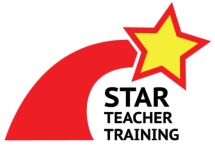When I first started teaching in Vietnamese public schools with 45 students the only resources I often had were sets of flashcards and a chalkboard. Back then I didn’t know many flashcard listening games that would work with dozens of students and I struggled to involve and engage them all. Fortunately, there actually are a bunch of games that work great with large classes of young learners. Two simple examples of flashcard listening games are Hands on Heads and Flashcard Groups. I learned these flexible TPR listening activities from Carol Read and they’re great for EFL students across many ages. Continue reading below so you can use them with your students!
Related Post: Simple EFL Activities: Stand Up/Sit Down
Hands on Heads
Version 1: Put some of the target vocabulary flashcards on the board. Tell students to listen to you and put their hands on their heads when they hear a word that’s on the board.
Call out words that aren’t on the board and ones that are. Students follow along, putting their hands down or on their heads as needed. You should also do the actions so students can confirm their answers. Play for a couple minutes until students tire of the game.

Version 2: Put the flashcards into two groups (A and B) onto the board. Divide the class into two groups (A and B as well). Students listen to you and put their hands on their heads when they hear a word from their group. They put their hands down when they hear words for the other group. I like to mix in words that aren’t from either list as well. This game also lasts for just a few minutes until the students tire of the game.
Flashcard Groups
Put the flashcards into several groups (A, B, C…) on the board. Assign an action for each flashcard group such as stand up, sit down, raise your hand, clap your hands, stomp, etc. Students listen as you list words or speak in sentences. Students do the corresponding actions for each word they hear.
This activity can be challenging and complicated for learners at first. They’ll need some practice before they get really comfortable with it, so don’t be surprised if it drags a bit at first. Some teachers report that their EFL students “don’t like the game” after the first try, but discover in later lessons that their students are perfectly happy to play.
This activity also works best if you provide visual cues for the actions of each flashcard group. I made action cards that I used every time I played this game for consistency.
Finally, I also found that putting the actions in the same order each time we played the game helped students play more confidently. It can be a little challenging for young students the first time you play it, but they really grow to like it a lot over time.

Giving instructions for Flashcard Groups. Each letter group (R, S, T, U) had a corresponding action.
Related Post: This EFL Listening Game Involves Everyone: Flashcard Safari
Flashcard Listening Games Tips
Minimal Pairs: This activity is great for getting students to also listen for minimal pairs for pronunciation. For example, Vietnamese students really struggle with hearing “s” endings in plural words. This prevents them from hearing and replicating the sound naturally. You can get students to practice listening for “s” endings by mixing the singular and plural forms of words into different groups. This will quickly train their ears to hear the sound differences.
Speak in Sentences: I also like to put the words into sentences in both games for additional challenge to young learners. Sometimes I’ll even tell little stories that use the vocabulary so they can hear the words in context.
No Winner Needed: Neither of these flashcard listening games require a winner. Trying to determine who is “out” or who the winner is will just slow the pace of the games down, keep students from participating, and remove the focus from learning. Just keep playing until the children start to tire of the game. The students will play as long as they find it fun.
Pacing is Key: Steady pacing is important for these games. Avoid going too fast or too slow. Try not to break the pace while you play. Breaks in the game provide opportunities for students to get distracted. Going too fast will prevent some students from keeping up and you will lose their attention. Just make sure to keep an eye on your students’ energy levels & focus and then adjust accordingly.
Don’t Do All the Work: Many teachers make the mistake of signalling the answer as they speak and before their students have enough time to react. These teachers are trying to keep the pacing fast & fun, however they do all the work for their students. The kids just watch and mimic whatever the teacher does instead of actually processing the language.
Make sure to slightly delay doing the correct action until students have started to respond. Use your action as confirmation of the correct answer so students can check themselves – don’t give them the answer before they are able to do the work.
Keep it Simple: Your students will have to process a lot during these flashcard listening games, especially in Flashcard Groups. Don’t add even more challenge by making students speak or repeat after you during these games. Instead, focus on packing as much listening practice as you can in the game and leave time for games/activities that are focused on providing speaking practice later.
Related Post: Drill Sergeant is an Easy EFL Activity for All Ages
What other flashcard listening games do you like to use in large classes? Don’t forget to like, share, and comment below!






